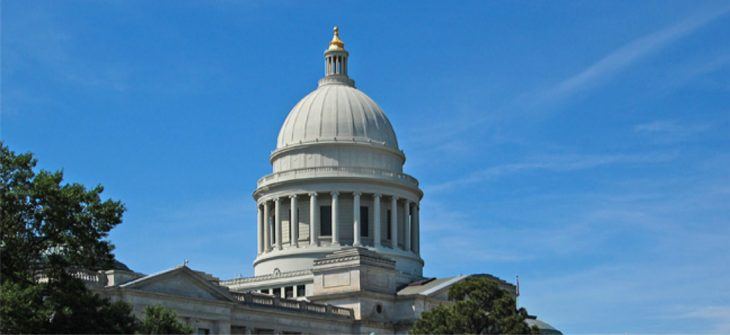Legislative panels pass ACCESS bill with student political activity amendment
by March 10, 2025 8:35 pm 1,449 views

The House and Senate Education Committees passed Gov. Sarah Sanders’ far-reaching Arkansas ACCESS Act on March 10 with an amendment granting excused absences to students engaged in political and public advocacy activities.
In separate voice votes, a majority of House and Senate members approved the two identical bills, Senate Bill 246 by Sen. Jonathan Dismang, R-Searcy, and House Bill 1512 by Rep. Matthew Shepherd, R-El Dorado.
The full House and Senate will vote on their own chamber’s bills Tuesday, March 11. Then they will vote on the other chamber’s bill on Thursday. With no more committee meetings necessary, the bills could be headed to the governor’s desk by the end of the week.
ACCESS stands for acceleration, common sense, cost, eligibility, scholarships, standardization.
The 123-page ACCESS Act would allow the Division of Higher Education to implement a funding formula supporting noncredit programs at higher education institutions. College instructors could not compel students to personally affirm or adopt certain ideas or beliefs. It also would increase the first-year award for the lottery-funded Academic Challenge Scholarship from $1,000 to $2,000, among its many other provisions.
But the part of the bill that drew by far the most attention was Section 23 on page 36, which originally stated that K-12 public school districts and open-enrollment public charter schools could not grant excused absences for political protests, social or public policy advocacy, or attempts to influence legislation or other governmental policy-making at the local, state, or federal level.
The sponsors amended the bill to allow those activities — other than the protests — to be excused.
The amendment came after that section drew questions from several lawmakers and vocal opposition from dozens of students. Rep. DeAnn Vaught, R-Horatio, said it seemed to prevent students from engaging in political activities and seemed to remove local control. She noted that students have spoken about bills at the Capitol. One helped her pass a bill related to Holocaust education in an earlier session.
In response, Dismang and Shepherd said students could still engage in that activity, but the absence wouldn’t be excused. Vaught said students cannot make up work lost in an unexcused absence. Secretary of Education Jacob Oliva later acknowledged that fact. Dismang later said in an interview he was unaware of the penalties associated with an unexcused absence.
“When I learned that the unexcused absences meant that they were not able to make up school work, that changed my perspective,” he said.
He and Shepherd amended the bill to allow such activities, not including walkouts, to be excused with a note from a parent and approval by the school. School districts will submit an annual report about the absences to the Department of Education.
Dismang said it was important to keep track of what is being excused so districts wouldn’t be choosing “what was worthy of advocacy and what wasn’t.”
Student walkouts won’t be granted excused absences because of the safety issue involved in students leaving class, Dismang said.
Dozens of students spoke against the original provision in the morning and evening sessions. Ava Kate White, a student at Little Rock Central High School, said this could be the last day where she would have a say in legislation without being labeled truant. She said the legislation could suppress young people’s voices and noted the nine students who integrated Little Rock Central High in 1957 didn’t give up when they were denied their rights.
Tyson Thompson, a senior at Mills University Studies High School in Little Rock, asked, “Why wouldn’t y’all want to hear student voices?”
The amendment did not change a similar part of the bill dealing with college students. Dismang said they are making adult decisions about whether it’s worth missing a class.
